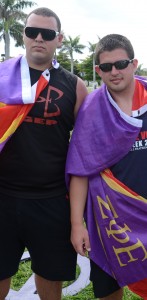
FAU has expanded Greek life in the past five years, but getting a new chapter on campus takes time, and the number of new sororities and fraternities is not up to the university.
Since 2007, the Greek Council — a group of students and staff in the Office of Fraternity & Sorority Life — has been bringing new fraternities and sororities to FAU every single year, according to Assistant Director for Fraternity & Sorority Life Ryan O’Rourke. But starting a fraternity or sorority can take up to a year or more depending on the chapter’s national organization and if they’re willing to fund new chapters, since FAU doesn’t pay for them, according to O’Rourke. Also for the new chapter to get approved, there are forms to fill out, members to recruit and guidelines to follow before an organization can start on campus.
The first step to starting a fraternity or sorority is speaking with O’Rourke. According to him, students who want to make a difference on campus or in their community by starting a Greek chapter can contact him, and he will help them find one that does just that.
“At the end of the day, fraternities and sororities are the same,” O’Rourke said. “They do the same kind of things, but I think the purpose is a little different, and I think that is what people should be looking at.” Greek organizations are divided into different groups, like social, academic or political, and there’s no waiting list for starting a Greek organization, according to O’Rourke. Any student who has done their research can start a chapter.
“There is not a waiting list,” O’Rourke said. “The way our policy breaks down is if students want to start a fraternity or sorority and they follow that process, we will just work with them on getting that process finalized so they can start a group at any time.”
After a year of researching and recruiting, junior business major Frank Estrada now needs 15 interested men to officially start meetings and recruitment this fall for Latin Fraternity, Phi Iota Alpha. This fraternity was started through a student run petition process. Students present their reasons and goals for starting a new chapter at FAU to the Greek Council. Organizers also need to prove there are at least 15 students interested in the chapter. Once students do that, they are approved, according to O’Rourke.
“The petition process is the student run process and advice that I would have for students is I think that if there are a few students trying to start a fraternity, they should start reaching out to their network, friends and people they are close with and really talk about the purpose of the organization”, O’Rourke said.
Estrada also had to turn in letters of recommendation and a resume before he could bring this chapter to campus. “The process has been [going on] since last semester, fall 2011. It is done with a lot of help and you can not do it alone,” Estrada said. “It has been a challenging process with its ups and downs.”
Phi Iota Alpha missed deadlines for turning in their paperwork and have been waiting to get approved since last fall. “I have to constantly remind the [potential brothers] that this takes work and will not just happen overnight,” Estrada said. “Everyone wants to be a brother and enjoy the perks immediately. Only a few want to work to get the organization off the ground and running effectively.”
There is also an alternative expansion process, in which the sorority or fraternity is started by the national organization. O’Rourke explains, “So a staff member at wherever their headquarters are will call and say we’d love to be on your campus and we follow that program.” Then the Greek Council recruits students who would like to join this specific chapter.
Since sometimes national organizations don’t have enough funding to start a new chapter, the process can take some time, according to O’Rourke. “Instead of having five fraternities and sororities come in the same semester, we try to scatter them out each year,” he said. This is so O’Rourke can make sure that the students have enough money and support from their national organization. “All costs associated with starting a new fraternity/sorority are at the expense of the national organization,” said O’Rourke. These processes are the same at all other Florida universities and are not funded by the school.
O’Rourke mentioned that FAU’s efforts in becoming a more traditional school will help bring in more Greek chapters. “As FAU is becoming a more traditional campus, I think that more organizations are starting to realize what FAU is all about,” O’Rourke said.
























Jason • Mar 27, 2012 at 10:25 am
Maybe we could focus on chapter size rather than throwing anything against the wall to see if it sticks? Killing an existing chapter by starting a new one, or making chapters so small that they can’t financially afford to follow the rules is always irresponsible.